#shu ramblings
Text
...was going through jeff's ig looking for something and i can't believe i forgot about these?? *adds them to the filmania!kim folder*


also is that supposed to be a phoenix on the back of the red jacket?
ohhhh what if filmania!Kim = fan of Porsche (as a fighter) and Chay sees him at a fight and mistakes him as Wik and... *mumbles to self about fics i don't have the time to write*
55 notes
·
View notes
Text
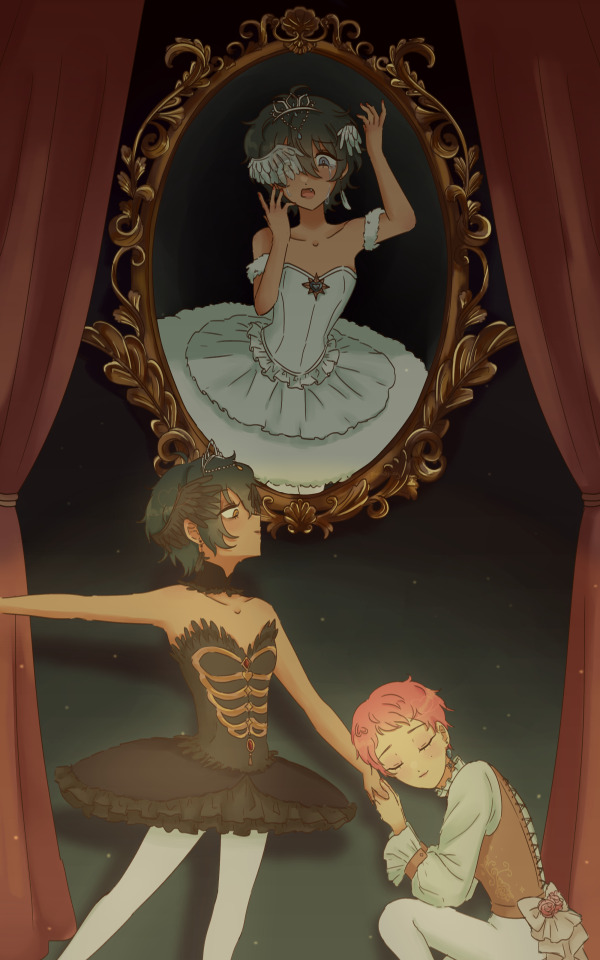
swan lake x valkyrie
#enstars#my art#ensemble stars#fanart#shu itsuki#mika kagehira#shumika#HEHEHE hi i havent done tag rambling in a while#but this was a piece for hourly shumika's fairytale collab!#my group decided on swan lake so this is the scene in which prince siegfried is deceived and swears his love to odile instead of odette#i sat drawing for so many hours in a row bc i wanted it to feel just right 😭 i hope i was able to capture the moment well#i wanted odette and odile to both be mika because i found out that the two roles are often played by the same dancer#and i thought that was a REALLY REALLY cool concept i could try and portray here.. also note which eye colors are visible on each#gosh.... odiles outfit is based on mikas fs1 with the ribcage i love the ribcage i think mika should have another ribcage outfit#IDK WHY I WAS SO SHY TO POST THIS HERE LIKE I KEPT PUSHING IT BACK BUT its here now YAAY#hehehe anyway i think thats all i wanted to say.. i hope u guys see my vision..#let me know what u think!!#ok thats all byebye :3
268 notes
·
View notes
Text
early ! era shu is such a funny guy. hes such a pretentious cunt. and it's even funnier now that we know how his development went its
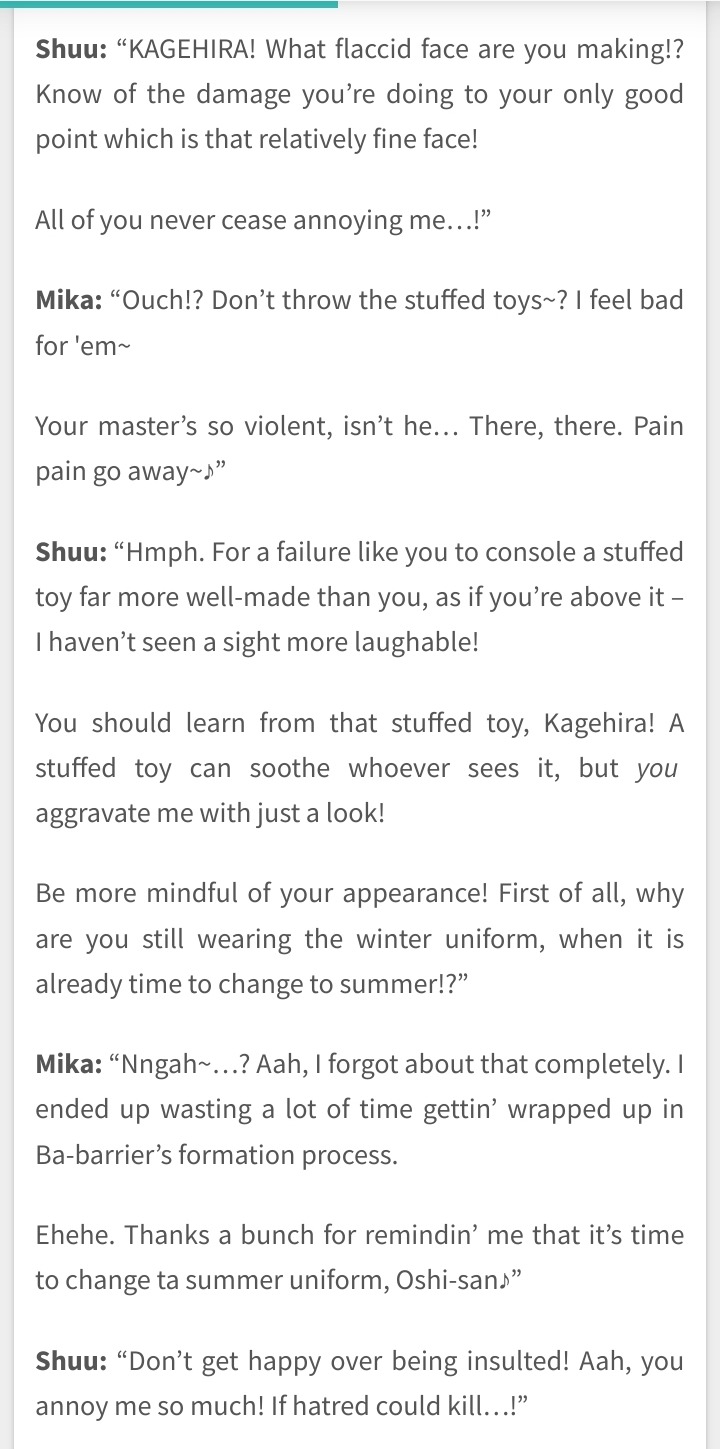
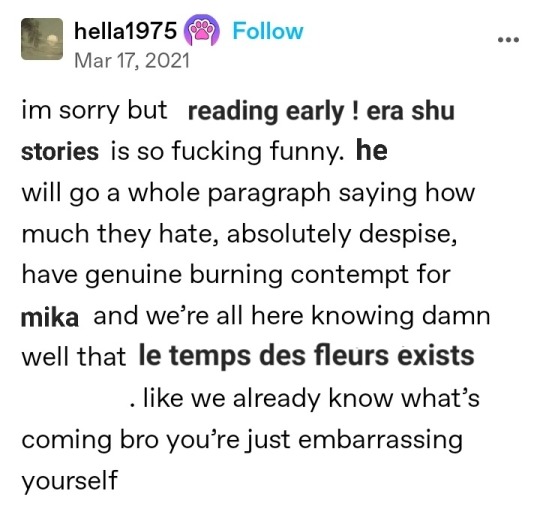
#''if hatred could kill'' GJADHKSDJSKNFSMS#well nowadays you thought he was going to move in with you to a cozy atelier in paris the city of love#and you were soooo flustered and disappointed when it turned out to be a misunderstanding#how does it feel#enstars#shu itsuki#mar's midnight rambles#also yeah i love that textpost dearly i havent gotten enough mileage out of it#need to edit more guys into it
201 notes
·
View notes
Text
@esper-aroon has enabled me, so here let me scream at y'all about The Imperial Uncle.
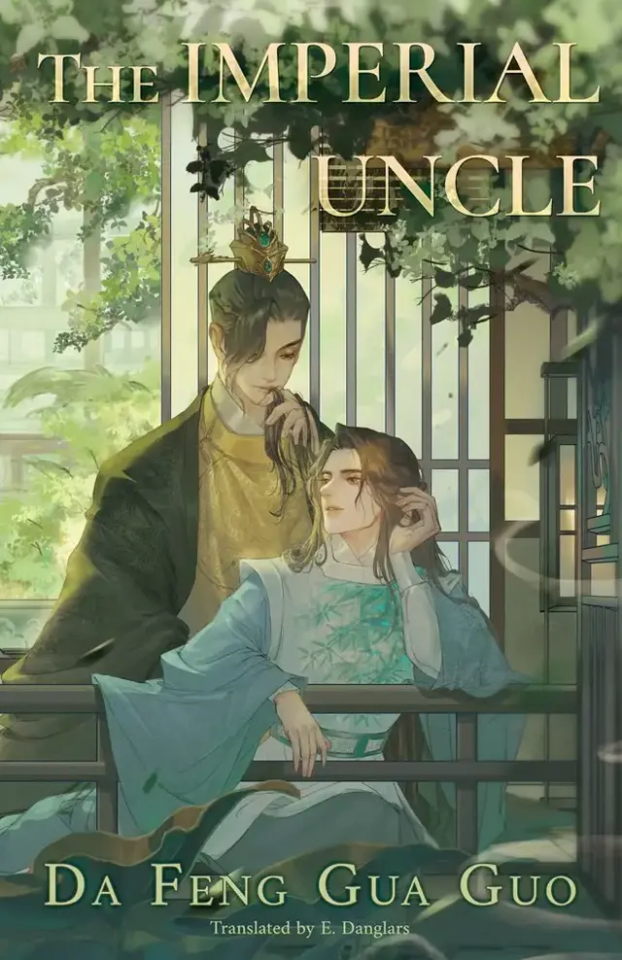
Okay, so I recently read The Imperial Uncle (Huang Shu) by Da Feng Gua Guo from Peach Flower House and I really loved it??? It's first person pov, mlm, about the Emperor's uncle Jing Chengjun, who is mistrusted by everyone simply because of who his parents were and his position, and so he's basically given up on trying to convince people that he's actually a nice, decent person without ulterior motives. He's super trapped by his position, and there's so much he can't say and do, and he's also a hopeless romantic, like, from his own mouth all he really wants is to sleep beside and wake up next to someone who actually gives a shit about him, and even that is basically out of reach in his life. Like, the book starts with his wife (who he has never once had sex with) storming into a meeting he's having and announcing he's a cuckold and she's pregnant.
But also, this poor bastard really thinks he knows what's going on and his very smart. Very unreliable narrator. He's actually kinda a hilarious, impulsive himbo. But the TL:DR is that his loneliness and isolation and the extent to which he's politically trapped routinely lead him to make absolutely terrible decisions.
E. Danglar's translation is absolutely gorgeous, too, and... idk, if you love political plots, melodramatic idiot main characters, a dose of pining, and a slow burn that eventually pays off, come take a look??? (some people think it's a love triangle??? idk, I never really got that vibe, I never felt it was really in doubt which of the two potential dudes he'd end up with, but maybe I only feel that way because I got it right, lmao).
Anyway, I can't stop thinking about how these two idiots end up finally finding each other and getting together, and I have an entire AU in my head (a modern corporate one) and part of another (canon divergent from like a decade before the book starts), and I just want people to love this book as much as I did and scream with me about it.
#unforth rambles#da feng gua guo#the imperial uncle#huang shu#the first au is jing chengjun and li ransi meet and have a fling during a vacation#and then find out that they work for the same company#hijinks ensue#the other is an au that starts with what if jing chengjun's father had actually been accused and convicted of treason#whether he was guilty or not#and his family was sentenced to death#but because jing chengjun is a youth he is instead made into a eunuch and forced into servitude to the imperial family#i know it's a stretch that someone of his stature would be treated that way instead of killed or sold off as a slave#i just don't care#anyway he's given awful jobs at first and they leave him weak and sickly but eventually it because clear he really isn't a threat#and he's allowed to help raise the princes in the next generation including the crown prince#and he also gets to know the other young people around the palace but as a subservient slightly older person#instead of as their elder of higher rank#and then liu tongyi is like okay so everyone thinks you're useless do you want to be a spy for me and help me uncover treason#and he's like FUCK YEAH#and love unfolds from there ofc
100 notes
·
View notes
Text
[warning: Enstars brainrot is back after a whole year, I still ramble like a nerd, spoilers for Raison d'être event story]
Valkyrie - Le temps des fleurs
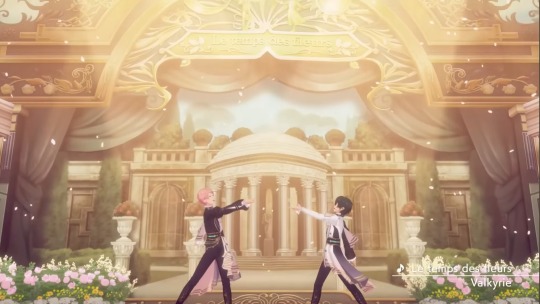
*:・゚✧ Lyrics, video and story analysis :*✧・゚
(even if it's so obviously gay)
I have resurrected my enstars obsession and I found myself fated to dissect Valkyrie's intriguing songs once again, as it seems their relationship has progressed much since last time I had checked on them. This is one going to be elaborate since the song is heavily tied to the event story Raison d'être and to the stage performance which is filled with plenty of symbolism.
˖⁺‧₊˚♡˚ Relevant links ˖⁺‧₊˚♡˚
Lyrics translation by ForeverAsia
Raison d'être translation by Mika Enstars
Official MV
*:・゚✧*:・ Title *:・゚✧*:・
The title of the song, Le temps des fleurs, which translates to "The time of the flowers", could be a reference to the infamous french song from the late 60s with the same title. The original song sung by Dalida directly derives from a russian romance song and depicts the tale of a woman who misses her lover and commemorates the time when they were together, young and carefree.
This is important to note once we provide context from the event story.
*:・゚✧* Raison d'être *:・゚✧*
In the event Raison d'être, which translates to "reason for being", a common french expression, we discover Shu's grandfather wishes to hold a live funeral and turns its preparation into a competition between the other family members. He creates a rather elaborate scenario in order for Shu to uncover the truth about his youthful days in France. Shu's succesful deduction, with Mika's help, enables him to prepare an opera for the funeral.
But Valkyrie had decided to partially cover the truth from the rest of the family in the narration of the opera. Thus, the story birthed actually ends up as an allegory for the relationship Mika and Shu have. (That is why, I will refer to the characters in the story by whom they represent)
Shu, a foreign student in France, passed by a mansion covered in roses and sighted through the window Mademoiselle, whom he fell in love with. Each time he had seen her, he fell deeper and deeper, ending up entering the mansion, unable to contain his feelings.
To his dismay, the beautiful woman he had fallen in love with turned out to be just a life-sized doll.
But the story isn't simply just that. In the mansion was also, of course, a dollmaker, Mika, who had modelled Mademoiselle after his appearance in women's clothes. Deeply moved by Shu's devotion, who had been sending love letters and had been whispering his love in the night, Mika had fallen in love with him, only having been accustomed with the solitude of his own mansion up until then.
But since the discovery of Mademoiselle's true nature, Shu had fallen depressed. Mika decided to dress up in women's clothing and warmly recognise the man's feelings.
「 Je t'aime 」
"I love you"
Mika thought it would end up as a heartfelt, passing moment and their lives would fall back into monotony. But Shu's wishes had just become true — the woman he loved had loved him back.
Since then, he had visited the mansion time and time again. Everytime there was a knock at the door, Mika would hurringly put his women's clothes and makeup on.
This concludes the first act, a comedic tale about the tumultuous existance of a same-sex relationship in a time that wasn't very accepting of it. (As stated by Shu himself)
The second act is an epilogue of the events. Shu had gone back to Japan to fulfill the duties of his family, but promised himself he'd reunite with Mademoiselle. Years later, upon his return, the mansion of roses had decayed, the flowers withering. The only thing left was an inscription on the walls, written in red as if it were fresh blood:
「 Je t'aime 」
"I love you"
-------------------------------------------------------------
Instictually, you'd think that the roles of the story should be reversed. Since Mademoiselle is an extension of Shu, and Mika is a devout follower of Shu as an artist, wouldn't it make more sense for Shu to be the dollmaker and for Mika to be the foreign student?
That is clarified by the diverse use of the pronoun "I" in japanese throughout the retelling of the story by Shu and Mika. When talking about the foreign student, they use "boku", the pronoun version Shu usually uses. The dollmaker, instead, uses "ore", the pronoun version Mika uses. With that in mind and a little thought put into it, you'd see the pieces falling into place.
The first act depicts the relationship Mika and Shu had up until that point. Shu had fallen in love with Mika, the marionette, but the events of Valkyrie made him realise Mika being a mere marionette in his eyes was inhumane — it wasn't real love, but a devout admiration. Mika, though, had proven himself, slow and steady, to be a real human with free-will, wishes and ambitions, in front of the person he loved — an equal. Thus, Shu could truly love the person he only dreamed of loving previously because love can only really bloom between two equals.
The second act depicts Shu's fears about their future. At the beginning of the event story, he reveals he had already prepared a room for Mika to live in Paris so they will continue their lives together. When Mika told him about wanting to remain in Japan after graduation to maintain Valkyrie , Shu spirals out of control, betrayed and fearful. In his eyes, Mika refused maintaining, or even strenghtening, their relationship. In the opera, that is what Shu imagines would happen if they remain separated; one day, Shu would not find Mika waiting for him, having dissapeared from his life, their love withering.
Unlike the opera, we will discover the song, Le temps des fleurs, "ties the knot" of their thread of troubles and feelings.
*:・゚✧* Lyrics & MV *:・゚✧*
[Shu] - pink
[Mika] - green
[Shu and Mika] - blue
In the stage background is depicted the Eiffel Tower to represent where the story takes place, in Paris. This coincides with the city where Mika and Shu sort out their feeling about their future.
Mistakably compared to a marionette, those blue eyes seem vacant
As this foreign romance spun with a stranger begins to close
Wayfaring through an illusion, traversing on streets of stone
Wandering, endlessly, like melting wax dripping in diurnal rhythms
The two commemorate the circumstances of their early relationship, Shu mistaking Mika, a masterful artist, for a mere marionette, leading to a temporary love that couldn't truly exist this way, that melts with each passing day under the sun rays.
The night burns into the dawn, and the heart that yearns without reward
Has long since overlapped
Even if it���s the same as the breeze, that blows through in its flurry of gales
Even if Shu finds out the truth, that love for a doll can't be truly love, he still holds onto it despite all the misfortunes that have come his way, mainly the rough days of Valkyrie. His love for Mika was a "breeze", a gentle wind, in the midst the despair reminiscent of a "flurry of gales", a circular mass of strong winds that entrapped him.
In the MV, during this part, Shu and Mika hold hands and sway together as they sing. It is a crucial moment since (from my knowledge so correct me if I'm wrong) Mika and Shu haven't made such heartfelt gestures on stage before. It highlights how the songs have gradually become more concentrated on themselves, rather than Valkyrie talking to the audience like in the past.
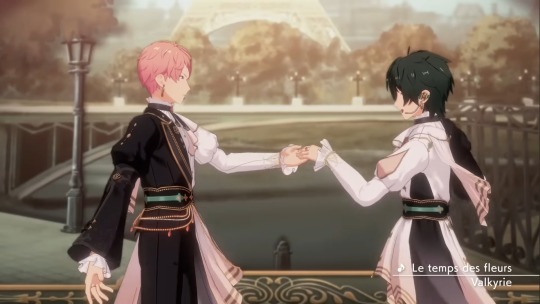
O city of flowers, this love too can bloom, even on the wayside.
It shall remain as a single song
Sear that gorgeous splendor onto each other’s hearts
As this beloved shadowed silhouette[1]
Turns this into a phantasm tale
From the story of the opera written by the two, we can conclude that flowers represent love. Paris, the city of flowers in this case, is also the city of romance.
Even if their feelings seemed impossible of becoming reality because of the rather troubled beginning of their relationship, their strenght had led the two to believe it is possible to achieve, "even on the wayside". They would even accept it even if it were just a passing moment, "a single song", as long as it was real and satiatied their desires by "searing that gorgeous splendor on each other's hearts". When the moment of love would cease to exist, if it ever does, they believe it will be immortalized in their memory as a "phantasm tale", thus having no regret ever experiencing it.
During this moment, the MV background switches to the Temple of Love on the grounds of the Palace of Versailles. The choreography in front of this place dedicated to the women "loved" by the french royalty[2] is also very suggestive of the ignition of romantic feelings. Mika and Shu reach out their arms to each other's hearts as the camera focuses on their shared gazes during the moment. Not long after, the camera focuses on their hands as they join together in front of the Temple of Love, signifying their romantic union.
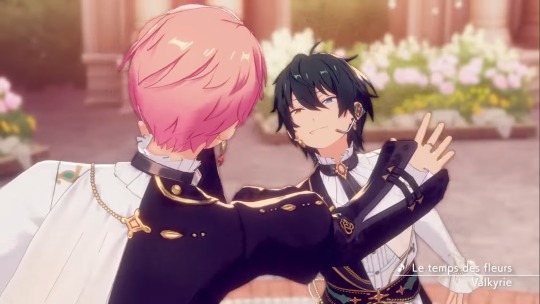
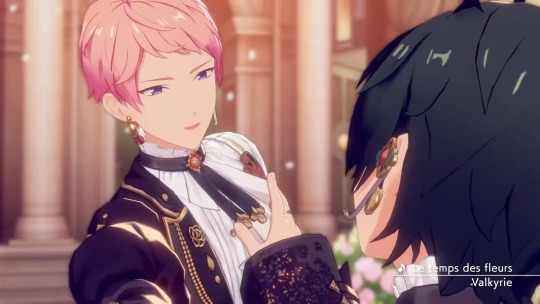
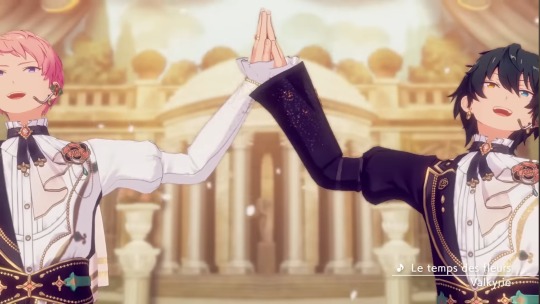
[1] The original translation on the fan wiki says "silhouettier", which is a word I couldn't find on any online dictionaries. I will assume they meant "silhouette", like other translations.
[2] The factuality of that statement could be debatable, but I am no expert in the matter, nor is it the focus of my point.
-------------------------------------------------------------
[The following segment isn't in the MV so it will be delimited with red.]
Even if we cling onto such ridiculous prayers
The feeling of hopelessness will never disappear, will it?
In that case, let’s leave the meaning of our encounter behind
As we change the regalia belonging to coincidence and fate
In this verse, they seem to be voicing each other's perception of their new relationship.
Shu is still on the edge about their future, as seen especially at the beginning of the event story. Despite both of them having shared such devotion for each other, he cannot help but feel hopeless that it would all end at any step.
Mika recognizes this and keeps looking forward, wanting Shu to adopt the same way of thinking. He has also been the first push that had led to the rehabilitation of Valkyrie, with the help of his faith in his mentor and the love he harbors for him. In this verse, it is also suggested that Shu isn't quite over their relationship during the ex-Valkyrie, thus the source of his hopelessness. It is also evident in the event story when he keeps mentioning Mika had become a human, probably fearful they would regress to their past dynamic.
Some things are unforgivable
Rather than grieving over those sins
Shall we dance the night away instead?
As I reach out my hand to you
And for you to look back at me
They seem to accept their irredeamable past that had led them to the present moment. If it meant reaching that point where they could share their love, "dance the night away", reach out their hands and look back at each other, it was worth it.
Is it possible to worry about the destination of an endless dream?
Even if it’s something that is not finite in nature
Let’s keep it forever, the shine that lasts only in this world
As we are sought and lured by each other
While having our souls turn into a phantasm tale
Unlike the love for a marionette that would melt with each passing day, this love, the love of an equal, is an "endless dream" and "not finite in nature". This current love that they share is more important that their "destination", meaning that they shouldn't worry about the future, which they did at the beginning of the event story, since their love would triumph even against time. This act of being "lured by each other" is compassionate enough to not just dissapear, get immortalized in their memory as in the first chorus, but instead the devotion for each other would be the one to immortalize them as lovers of a "phantasm tale".
-------------------------------------------------------------
Before the bridge commences, the background of the MV becomes pure white, turning Mika and Shu into mere silhouettes. The atmosphere is heavy. When they try to reach out for each other, they miss each other's embrace, unable to look back at one another. This could represent the moments when they feel lost during their relationship, an example being the opening scene of the event story.
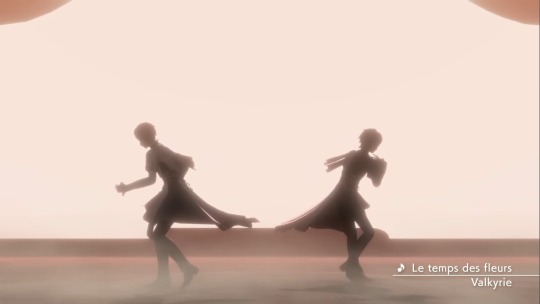
Even if it’s worn and arenaceous
If you lift its casing, its contents will overflow
So even if time is bound, the shades and chromes will still remain
Painting the future in a blinding iridescence
Each verse of the first three is split in half between the two, representing a separation, but proving that, despite the circustances, they share the same feelings about their relationship.
Even if their love is "worn and arenaceous", almost on the brink of dying, "if you lift its casing", its coffin's lid , it will prove to be as strong as ever, "overflowing". Even if their love will die out, its impact will leave an imprint on their lives.
In the final verse, their voices join and their gazes meet. The conclusion is that, no matter the outcome, their love would brighten their future with "a blinding iridescence". Stripping themselves of the worries about both past and future, by embracing the present moment of their love, they have freed themselves.
In the background, the Arch of Triumph is revealed and the stage is filled with blooming flowers, a symbol of their love as established earlier. Then, the second[1] chorus begins.
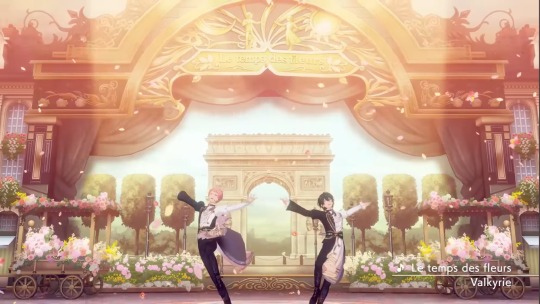
[1] It is the third chorus if we talk about the entire song. But since this chorus mirrors the first one, it would be more suggestive to call it the second one, like it is in the MV.
O city of flowers, the entire town itself is wrapped in your love
Even the days that passes on by has bloomed and scattered
Let this continue to reverberate forevermore inside each other’s hearts
As this beloved shadowed silhouette
Manifests for this very reason to make you dance
Alongside this song of love, this song of love
The choreography is the same as the one in front of the Temple of Love. If the first time it was about the reciprocity of their feelings that had no clear duration, this time it is the confidence that they are eternal. Mika and Shu are victorious in their love's battle against time and, once again, can reach out for their hearts, look back at each other and join hands.
The final statement is made as their love is finally triumphant over all the hardships Valkyrie had to endure. Their love is so radient, "the entire town itself is wrapped" in it. Even if these moments of love, which have bloomed, would "scatter" in the past, they believe their feelings would keep "reverberating forevermore inside each other's hearts". The song ends with the acknowledgement of its true nature, it being a "song of love".
The MV ends with Mika and Shu looking into each other's eyes, arms ready to reach one another, but far enough to not yet be touching each other — for it is only the first step in their true relationship. The camera pans to Shu's face who, usually, doesn't allow for his affectionate side to surface easily, lovingly looking at Mika.
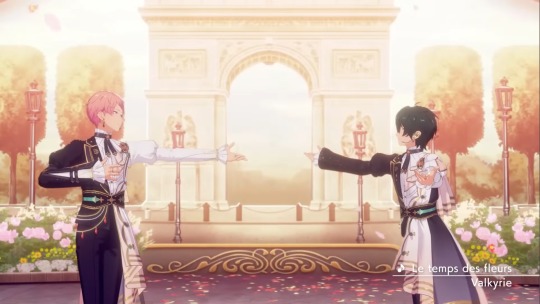
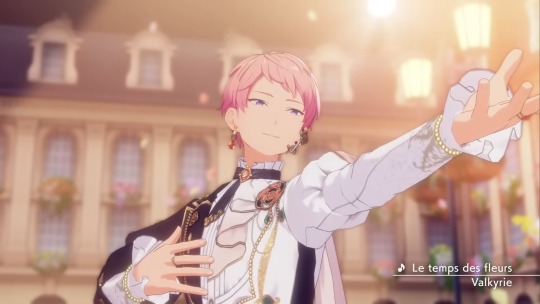
On a final note, it is really important to mention the outfits. There could be many interpretations for the split appearance of them: funeral and marriage, shadow and light, masculinity and femininity. Either way it may be, the outfits themselves represent union. If in the past, for example in "Eternal Weaving", Mika and Shu were distinguished by a certain symbol, like shadow and light, through their love, they have attained balance. It is both a funeral and a celebration of love. The clothes are the recognition that the lovers are both composed of light and shadow and that they complete one another. They are a symbol about appearance and essence, where one half is seen by the world (Shu in a tuxedo, strong and independent; Mika in a dress, soft and innocent) and the other only by the lovers (Shu in a dress beause he is quite emotional and compassionate; Mika in a tuxedo because he is strong-willed and would do anything for their hapiness together).
In the silence that follows, we can only have faith their love would prevail over anything in their way of looking into each other's longing eyes.
*:・゚✧*:・゚✧*:・゚✧*:・゚✧*:・゚
Thank you for bearing with me! I am so crazed by their love story I had to go all out. I don't think straight romance has achieved this kind of depth yet, I am afraid. (Don't try to prove me wrong, I am right).
#ensemble stars#enstars#ensemble stars music#rhythm game#ensemble stars valkyrie#valkyrie enstars#shu itsuki#mika kagehira#shumika#music#music analysis#lyric analysis#lyric interpretation#lgbtq#gay gay homosexual gay#utter rambling
56 notes
·
View notes
Text
sometimes i remember that theres canonically a very large audience of little kids who love valkyrie and that makes me so very happy
like i imagine like most of the other units all have a population of very young fans as well but just the fact that they singled out valkyrie specifically as being the unit that little kids like is so precious to me. theres 7 year old girls out there who look at shu itsuki and go woag... i wanna be like that
little artists in the making
#cryn rambles#enstars#thinking abt that ryuseitai art made me so happy#i just love imagining these guys interacting with little kid fans#some of these mfs in ensquare are definitely Not good with children but some of them would be the sweetest ever#ryuseitai especially since they do hero stage shows theyve got the experience its kind of their thing kids love em#but mika is top tier also#shu probably has no clue what hes doing but mika helps#lazer rambles
134 notes
·
View notes
Text
ahhhh! the space shuttle no.8 album has arrived!!! i'm lowkey amused that it came to me on 8/8/2024 (with 2024 adding up to 8 if you're into numerology haha)
it's so beautiful!! i'm gonna wait until after tonight's test (as a nice treat/reward) to actually take a look at all the photos and read the book (is it autobiographical?? is it fictional?? is it going to give us more jeffcest lore??? i can't wait!! *vibrates*)
i need to stop myself from running my hands over the embossing on the box.
why is this so gorgeous??? aksd;lkfajweka
(also if anyone is curious, i got the standee of sunshine wearing the rings of saturn like a hula hoop and the train going around him :D)
24 notes
·
View notes
Text


2014ish-2024.................there were more jumps i promise....
#res rambles#LMFAOOOOOOOOOOOOOOOOOOOOOO embarrassing asf#shout out non-sims cause their blog was a source for some of these......#mind you her black hair only became natural like 2022 she was redhead then med brown to just black#oc:ShuChen#Yes shu is Jax they are the same i just hated the name after awhile#you can tell where my frontal lobe hit
26 notes
·
View notes
Text
Queer-platonic, married Shus, you're so special to me <33
#lassie is shawns bf btw <33#ill never stop talking about qpr!shus where shassie is also involved RAAAAA#psych 2006#psych#shawn spencer#burton guster#shus#shawngus#my rambles
37 notes
·
View notes
Text
Alright, so there's been some talk about whether Shusu is actually a different medicine vendor from Ri Kusu (show Kusu), and at first that was my assumption (or my preference since I found the characterization in the book went all in on the detached, stoic side of things than any of the other things that make Kusu an interesting character). But the more I think about it, the more I'm like "is he though?"
And my wondering about it comes from two places, first being that the theme of disentangling harmful attachments is what the book is named after, and the other is the descriptions of the taima sword both sheathed and released, as well as the descriptions of Hyper/Shingi thoughout the book
(spoilers for Shu, since I've seen more people asking about it lately, as well as including suppositions based on recent lore drops and some minor spoilers for Karakasa based on trailers and the like)
Starting with the descriptions of the sword and Hyper, despite the sword being depicted on the cover being a now seemingly defunct design from older promotional material for Karakasa, the sword is described in the first story, Kama Itachi, as having the kinds of colored stones that are characteristic of the Ri taima sword when sheathed.
When released, it's described in multiple stories with some variation of being "an enormous, glimmering blade," which is also what we've seen throughout the show for the Ri sword. The Shingi of Shu is described with gold, serpentine patterns snaking all along his exposed skin (also tanned but given Shingi also has darker skin, that specific detail might just go with being a spirit of the sword), Kama Itachi mentions gold brocade (it's unclear from what I was ever able to translate of it if it was referring to the robe or the markings, so take that with a grain of salt), Toutetsu mentions the kumadori markings on Kusu's face becoming more elaborate from how they started (compared, again, to Kon Shingi and Kusu where their respective face markings don't seem to have a whole lot in common except maybe the eyebrow area), and then Tamamo no Mae outlines the crimson eyes and silver hair. All of that sounds an awful lot like Hyper and the Ri taima sword (and you know, I kinda figured Fuguruma Youbi would have a better description to pull on as well given how like half a page was Tamenaga just contemplating Kusu's beauty and like, me too man, me too, but ah well)
Could it be a matter of these characteristics being in line with how swords associated with any of the hexagrams with fire as a component seem to show up? It's definitely not impossible, and I certainly don't know enough about how I Ching works to make any certain statements on that, but if I were to speculate on a little bit I noticed poking around a hexagram lookup table, with the hexagrams that are composed of two different elements, it seems to be less about one element being dominant over the other so much as two elements meeting in a certain arrangement to create a new result (and even with two hexagrams composed of the same elements, which of the two elements is on top of the hexagram can drastically change the meaning). So then if each permutation creates a unique end result, wouldn't it also follow that the respective swords would all be pretty unique from each other? How would you even determine that "yes, this is the trigram element this sword is associated with"? By the top of the hexagram? The bottom? The yin/yang alignment of the sword? To my mind, it makes more sense for all the swords (and therefore the spirits attached to them) to be unique to their own hexagram (again, not an expert by any means, I'm open to other takes on how that could work, this is just my working idea of how it works)
So if the swords ARE all meant to be unique, then it's a safe assumption that the sword in Shu is the Ri sword. Does that necessarily mean it's the same medicine vendor wielding the sword? Not necessarily, we don't have any information on what happens to a sword should a medicine vendor fall trying to slay a mononoke; does it disappear? Does the sword spirit die alongside that medicine vendor (especially if it happens after the sword's been released)? And what happens to a medicine vendor if a particular sword doesn't need to be in play at that particular moment, given that it seems from the lore drop that the number of swords in play can go up or down? Does he disappear? Does he get stripped of the qualities that made him a medicine vendor and continue living on as a human? Some kind of unaffiliated ayakashi waiting in reserve for when the sword needs to come back into play? Enter the collective unconscious? Is it possible for this sword to show up the same as it is for a different wielder? All of that is the realm of theories and headcanons for now, but it's not impossible that it's a different hand wielding the same sword (and if it's a different entity, is it a reincarnation of the same soul or is a new one selected?)
With my second sticking point being the theming of letting go of harmful attachments that is the book's namesake, which is a common theme that also runs throughout the arcs of the show (Tamaki and the cat being stuck to haunt the Sakai manor without having gotten any justice for the atrocities commited by the family, the zashiki warashi letting go of being ripped away from the women they chose to be their mothers in this life as well as Shino's letting go of the exercise in futility that would have been using her body and sacrificing the baby she already has to try to right that wrong, Genkei's fixation on his guilt over Oyou's sacrifice, Ochou's futile attempts to meet her mother's selfish expectations, the todaiji feeding the greed and obsession of the suitors and its own obsession with being desired, Ishikawa's drive and tenacity to find the truth persisting even after her death)
From that angle, the various stories in Shu are pretty much in line with that theme as well: Tokuemon's deep-seated grudge against his abusive father, especially when that abuse was suffered in service to an ancient obsession of his family for riches and honors; Hori Mondo's obsession with his late master and the honor that should be able to be assumed with the ruling samurai class which is disproven by his master's successor, who himself is obsessed with proving himself capable of filling his father's massive shoes, Ishiuemon's obsession with increasing his own power at the expense of Zen, who becomes obsessed with becoming Ishiuemon's wife even as she was nothing more to him than a pawn; Kei's attachment to the notion that she's owed something going right for her after a life that's been filled with hardships, Hagino's obsession with her husband's all-but-confirmed infidelity even at the cost of her daughter, Takaharu's not being able to keep it in his pants for the sake of the family he already has, Koharu's obsession with gaining her mother's affection; Shunsui's obsession with being a popular author and narrator and tainting Ofumi with that obsession when he betrays her trust to help get her love letters over to a more accomplished author that Shunsui both reveres and is jealous of; Jinjirou's obsession with getting his family's sacrifice properly honored when everyone around him seems keen to shrug it off; Tadayoshi's obsession with getting his daughter Kaede safe behind the walls of the Ooku and Kaede's drive to meet his expectations even as they bear down on her
I had mused a while ago that the feminist theming, in contrast, seems to be missing, putting more focus on the woes of the men in the story often at the expense of the women around them, but in hindsight I almost wonder if that's actually the point (and I think I'll find a more solid answer to this in Oni, from what I've gleaned so far, so this might be another "put a pin in it" thought as well...but that pin's going to be in for a very long time at the pace I'm going through this book lol). Another common thread with Shu is the letting go of how things used to be with a lot of the expectations chaining these characters coming from the Sengoku era, which just don't work going into the "peaceful" Edo era. While women's rights prior to Edo weren't exactly robust, they were stripped down over the course of the Edo era.
It could be taken, then, that this comparatively larger focus on men at the expense of the women around them is another reflection of moving into and accepting Edo-era paradigms, and also giving a peek into the unintended (or maybe "unintended") consequences of putting safety and control over freedom. From that angle, a medicine vendor meant to embody not just a woman's desire but also what a woman wants to be would also then become gradually less considered over time (and while he never had the kind of involvement in Shu that he does in the show, there is a general trend over the course of the stories of his engagement falling off a little more with each story). Ending the book with Nuppera-hofu, with Kaede losing her face as her father lost sight of why he was fighting so hard to get her into the Ooku ("she'll be safe there and won't disappear like my wife and eldest daughter did"), where it's not even clear which sister is the one being sent to the Ooku by the end of the story but what does that matter when the goal of getting to the Ooku was achieved, then leads in very nicely to Karakasa, where so many women have lost their individuality in service to "the greater good" until it hits a tipping point, the karakasa becomes active and starts upending everything that the Ooku was built on, and possibly even projecting that outward to reflect what's happening in the rest of the country as well
So then to bring it back to whether Shu Kusu is Ri Kusu or not, if being more passive, or more "feminine" starts to fall in line with the increase of systemic oppression women face in this new era, then in order to reclaim some of his own power and agency, Kusu would need to start to be more active, not a spectator but an actor, and then that leads into Ayakashi Bakeneko, where he's at his most emotive, his most active, and pushing the hardest to be in control of the situation, before gradually over the course of the show relinquishing more control to start to shift back into more of a passive spectator role as women start to chafe under the abuses they're suffering in this restrictive period and fighting to get some of their power back, having the second Bakeneko arc happening somewhere in the 1920s (still obviously a lot of problems, both the old deep-rooted ones and the new ones coming from the reactionaries that don't care much for these seeds of more equality between men and women starting to grow, Moriya being the poster boy for that group and their trying to act like they're the victims in all this while they start running out of justifications for "putting women in their place"), but with more power being reclaimed, he then wouldn't need to be quite as active or "masculine" to be able to have the power or influence needed to get the truths from the humans he needs to perform his duty, so then the differences in characterization could be reflective of what is needed for the era in question. It could also be a matter of the Ri sword and the need to cut away attachments becoming less and less necessary over this general period of human emotion, to where the sword is taken out of play by the end of Shu and the wielder of Ri we see in the show is either a new medicine vendor, or the same one but with a mandatory vacation thrown in there to discombobulate him on how human emotion sphere looks by the time he gets back
Anyway, that's a lot of rambling to say there's a case for it being at least the same sword if not also the same medicine vendor as the show, and it's a matter of the framing and themes of Shu not doing any favors to him for highlighting the things that make him a cool character
#mononoke#mononoke shu#mononoke 2007#mononoke karakasa#mononoke kusuriuri#rin rambles#and of course i write all of this with the assumption that hideyuki had access to the lore book for the series when writing the book#which i havent found any kind of information on one way or another so who knows#although ending on nuppera-hofu really does seem just a little too perfect to lead into karakasa to be an accident#and a few more things than what i mention here make more sense in the context of the lore drop anyway#so going forward im going to engage with the books on the assumption that they were intended to fit into broader series#instead of just being one person's interpretation of the basic premise who may or may not know much about the show#(which was probably an unfair assumption born out of my own disappointment that it wasn't really what i was expecting)#anyway
20 notes
·
View notes
Text
rewatching We Best Love knowing little Gao Shi De grew up to play middle Yuan in Unknown, but wait who is this familiar face playing little Zhou Shu Yi?
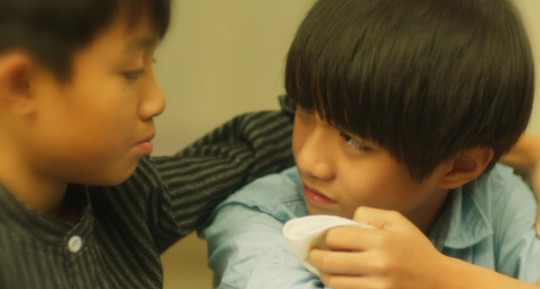
LITTLE YUAN THAT'S WHO
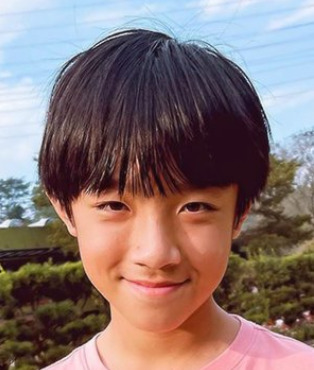
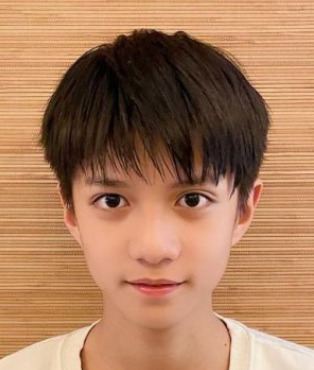
#i cannot wrap my head around it#little zhou shu yi and little gao shi de playing different versions of yuan#how did i not know this#we best love#unknown the series#關於未知的我們#永遠的第一名#this one rambles
39 notes
·
View notes
Text
I feel like we're sleeping on the meme potential of this image

19 notes
·
View notes
Text

ihave this disease called Being Right all the Time
67 notes
·
View notes
Text
okay so you mean to tell me that we spent this entire story learning about shu's grandpa's either gay or lesbian romance and shu tells mika yeah let's create a story just like that. the two of us. happily forever
yeah no yeah im fine and normal about that
#cryn rambles#enstars#shumika#SHU YOU ARE SO.#i dont care what anyone says theyre in love#'theyre not canon' read the story again and get back to me
145 notes
·
View notes
Text
Chronic shipper brain disease aside, my greatest hope for the HD re-releases of AJ, DD, and SoJ is that it reels in some more naruodo enjoyers / tolerators.
Not shippers, per say (although that would be nice), but at least people who see their fun broken-but-then-mended hero worship dynamic across all three games,



look at the fan art and fan fics made about it, and go, “It may not be my thing, but I get the appeal,” instead of picking up their metaphorical pitchforks because of an 11-year age difference between two unrelated adults who met as adults.

#ace attorney#spoilers#<- just in case#naruodo#hobopollo#neopollo#justwright#my ramblings#my second hope is that the ‘new’ trilogy finally gets some love instead of more backhanded compliments#like yes it’s messy and all over the place#but considering that Shu Takumi — the series’ main writer — was busy with other projects…. what came out without his lead wasn’t half bad#aa 5 & 6 are still a lotta fun to play despite all the plot threads it had to drop from 4#besides it’s just sweet seeing Wright pass the torch (sort of lol) and act like the mentor Mia was to him to Apollo and Athena now#anyway#all this to say I’m having a great time replaying the 3DS era of ace attorney on my switch ^^
46 notes
·
View notes
Text
I made a little yellow leaf space shuttle bracelet ☺️
36 notes
·
View notes